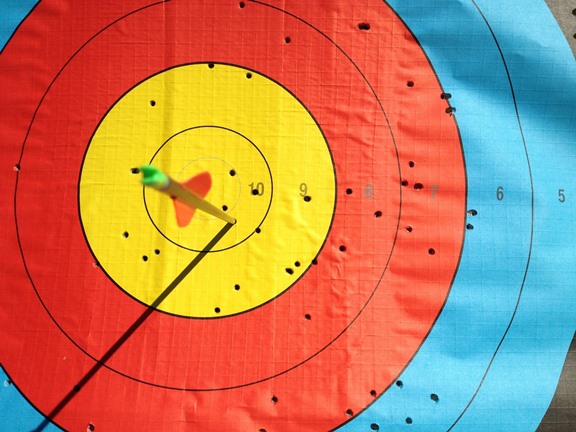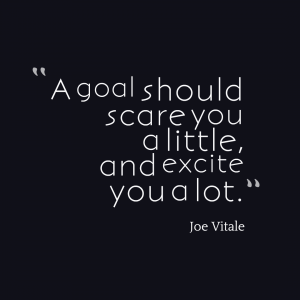
It’s common for people to look at their goals at the end or the start of each New Year. At some point in the past many of us have also set a New Year’s resolution to improve our health, earn more money or improve our relationships. However, irrespective of the time of year it is for you now, if you don’t have any goals at the moment or can’t remember the last time you looked at setting some then this post is especially for you…

Have you ever had that feeling where you’re genuinely excited about the day ahead of you… so much so that your body feels energised and fired up for the day?
If it’s been too long since you’ve experienced this feeling then perhaps it’s time to take another look at your goals. Are they working and, most importantly, how do they make you feel?
Part of the magic of setting goals is… they help you to transform parts of your life from where you currently are, to where you would like to be.
With this in mind, it’s time to visit 9 reasons why you should be setting goals…
1. Goals set direction and give us focus
Imagine a ship setting leaving port for a foreign destination with no navigational charts or, perhaps a plane taking off from an international airport with no guidance on which way to go to reach its intended target. When we don’t have goals we too become like a ship with no intended port, or a plane flying aimlessly among the clouds.
Goals give us the direction we need to take action. They also keep us focused and allow us to live with consistent purpose. Even in nature we see goals at work, although they’re possibly more at the subconscious or instinctual level than for us humans. For example, when a monkey gets hungry it will imagine food. It then goes to find that food to satisfy its energy needs. Similarly, after reaching maturity a bird will usually look to find a mate and breed so it can have offspring. In both examples goals are inexorably linked to survival and life.
If the monkey couldn’t set this basic goal it would simply die from starvation. If the bird couldn’t find a mate its species would quickly die out in a matter of months or short years.
Now you could argue that monkeys and birds don’t know how to set goals, so what the heck am I talking about? Well, really… are you certain about that… after all, what is else is a goal but an intention, a movement towards something or an impulse to act?
If chaos was life’s natural state then we’d live in a very different world indeed.
Whether at the conscious or subconscious level, even nature suggests we need to set goals and achieve them.
2. Goals boost our energy and levels of motivation
Ever had a goal that you were really excited about? The effect on your mental or emotional state can be overwhelmingly positive. Not only will it seem to give you more energy but you’ll often have much high levels of motivation that will last for many hours or even several days at a time.
How to know when a goal is no longer serving its purpose? Ask yourself, how does my goal make me feel in the present moment? If it’s no longer working for you, get rid of it and start a fresh. Set a new goal. Simple as that.
3. Goals allow us to measure progress
Without goals we simply cannot measure progress and development. By setting a goal or goals we can evaluate our results over time. This is a really powerful benefit. Imagine if we wanted to drive from point A to point B and had no way of knowing once we’d reached our destination. Life would suddenly become very difficult. By measuring progress we can make course adjustments along the way especially if we are starting to fall behind or go off track. How do we know if we’re veering off track if weren’t not measuring our goals?
4. Goals help us take control of our lives
If you’re already setting, monitoring and adjusting your goals then congratulations, you’re actually in the small minority. Most people don’t set goals or at least effective ones. They might have a vague desire like, I want to own my own home one day or, I wish I could travel overseas every year however, these are not goals but wishes.
By setting SMART goals and keeping ourselves accountable we can vastly increase the chance to control our own destiny. What is a SMART goal? SMART goals are:
- Specific
- Measurable
- Achievable
- Realistic
- Time Bound
That said, only goals that have a strong positive emotional effect on you should be considered.
5. Goals can boost self-confidence.
By achieving goals on a regular basis we create a positive feedback loop that tends to boost our self-image and confidence. We develop belief that what we desire, set an intention for and take action towards can be manifested in our lives.
Want to improve your mental health. Start setting short-term realistic goals and achieve them.
6. Goals teach us a lot about ourselves
‘Gnothi Seauton’, which is Greek for ‘Know Thyself’, was a most famous maxim inscribed at the forecourt at the Temple of Apollo at Delphi.
By setting goals and striving to reach them over time we gain a better understanding of our inner motivations and what’s really important to us. Also, over time goals can help us see patterns in our own behavior acting as indicators that we might otherwise not have noticed.
Life seems to fly by all too fast so it’s essential to live for ourselves and understand what makes US happy.
For instance, a student might graduate from high school and plan on enrolling in a pathway to study medicine and become a doctor. However, a few years later they might actually find out they personally have little to no passion for this field. The real reason they enrolled was because of parental or peer pressure.
When we don’t set our own goals we usually end up being part of someone else’s.
7. Goals act as stepping stones
The most effective goals are the ones that can be broken down in to bite size chunks or stepping stones. For instance, if your goal is to lose 10kg over a 12 month period then you can set the target of losing around 1 kilo per month which can then be broken down further yet again to 0.25 kg or 250g per week. By breaking the goal down in to smaller parts it can become much easier to see results, gain momentum and stay motivated. If your goal is too big or feels too ambitious to tackle all at once, see if you can break it down in to smaller chunks to make things easier.
8. Goals can help us develop  powerful daily habits
powerful daily habits
If you want to build bigger muscles or to lose a certain amount of weight/fat, setting goals can bring the added benefit of new daily habits. For example, daily exercise, eating less junk food or a new habit of eating salad or vegetables twice a day (maybe once around midday and another in the evening). Our habits and routine come to define us, whether we like it or not. What daily habits do you currently have that are defining who you are?
Do you like them, are they what you want to have moving forward? If so then great J
If not, then perhaps it’s time to take action and make a change.
9. Goals help us maximise our potential
Goals allow us to push our boundaries and improve our lives either internally, or externally. Imagine for a moment that you decided to set one small goal each and every day of the calendar year.
For example, you might set a daily goal such as to:
- Make an extra sale today
- Give a compliment to a stranger
- Take a 30 minute power walk with a friend or partner.
Assuming your goals are realistic and achievable then, following this idea you’d likely complete up to an extra 365 ‘mini’ goals in just one cycle around the sun. Talk about boosting productivity!!
When is the best time to set goals?
NOW, not tomorrow, not at the start of a new month but NOW. There’s no time like the present so take some time now to ask yourself what’s really important for yourself and invest some time in setting some meaningful goals.
What’s the best method for setting goals?
Following the principle of SMART is most certainly not the only way of setting goals. There are several different methods of goal setting that I’ll be deep diving in to in a future blog post so, stay tuned.
Would love to hear your thoughts about why you set goals, or don’t. What other benefits are there for setting goals that I haven’t included on this list?




Leave a Comment